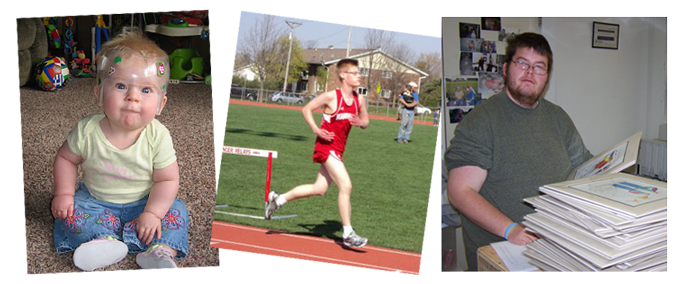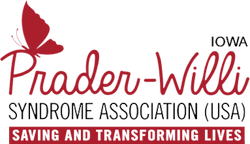Prader-Willi Syndrome Resources
External Resources:
- University of Iowa Children’s Hospital’s Center for Disabilities and Development Prader-Willi Clinic
Prader-Willi Syndrome is about People…
People who require support in varying degrees to manage the challenges of their disability. With proper dietary and behavior management, more and more people with this disability are living and working successfully in our communities.

What is Prader-Willi Syndrome?
Prader-Willi Syndrome (PWS) is a genetic birth defect, which occurs in 1:12,000 births. This genetic accident causes lifelong conditions affecting growth, metabolism, behavior and general well-being. Those affected by the syndrome are very individual, having varying degrees of strengths and challenges brought on by this disorder.
Prader-Willi Syndrome (PWS) is perhaps best understood as a multi-stage syndrome. The initial stage is “failure to thrive” with severe muscle weakness (hypotonia) and delayed developmental milestones. Infants are often unable to nurse or suck because of weak, limp muscles and may require special feeding techniques. Motor milestones are also delayed because of muscle weakness.
The next stage is “thriving too well”. A compulsion to eat becomes more apparent in toddlerhood. Previously agreeable and compliant behaviors may also give way to stubbornness and temper tantrums. In many cases, the drive to forage and seek food increases at varying rates and degrees requiring lifelong supports in order to control caloric intake and prevent morbid obesity. While the insatiable appetite and aberrant behaviors are the two most dominant characteristics of PWS, other issues are also part of the complex syndrome and require ongoing management and empathetic understanding. They may include: abnormal growth, incomplete sexual development, temperamental changes, cognitive limitations, abnormal caloric utilizations, reduced balance and coordination, speech and language difficulties, social isolation, dental problems, high pain threshold and irregularities in body temperature control mechanisms.
